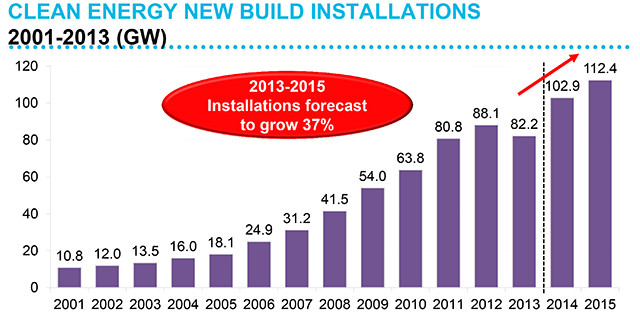The Turning Point for Clean Energy
Policymakers, Industry Leaders Say the Age of Renewables Has Arrived
Every industry has a turning point, or “phase change,” as Bloomberg New Energy Finance, or BNEF, has labeled it, and the remainder of this decade will demonstrate that we are witnessing the maturation of the clean energy industry. After two years of declining investment in clean energy, the mood might have been somber at BNEF's annual summit in New York, April 7-9. But the keynote addresses and panel discussions were filled with optimism.
Last year, new generating capacity from renewables also declined. “Is this a clean tech crash,” asked Michael Liebreich, chairman of the BNEF advisory board. He emphatically thinks not.
According to BNEF forecasts, the adoption of renewable energy is accelerating. In 2014, global clean energy investment is expected to grow to $300 billion. Installations of new generating capacity will increase 37 percent over the next two years. By 2030, capacity will triple.

Source: Bloomberg New Energy Finance Summit 2014, Michael Liebreich.
Sen. Wyden Calls for Tax Parity for Renewable Energy
Senator Ron Wyden (D-OR), chairman of the Senate Finance Committee, in his keynote address criticized the decades-old, piecemeal approach to tax credits for the energy industry. He called for a fairer environment where clean energy incentives have parity with fossil fuels.
“Policymakers need to think through how to provide certainty for investors,” he said. “We need parity and predictability.”
Sen. Wyden supports opening up Master Limited Partnerships to renewable energy projects. These business arrangements have the tax advantages of a partnership, but ownership equity can be traded as easily as public stock. He also will seek to expand the Investment Tax Credit to include waste heat to power, a proven industrial efficiency technology used to capture heat released during industrial processes that convert raw materials into products.
Sen. Wyden's comments followed the passage of a tax extenders package through the Senate Finance Committee earlier this month. Among other provisions, the bill includes a renewal of the recently expired Production Tax Credit, a critical policy measure that has spurred the development of wind power in the United States.
“Sen. Wyden made it clear that he intends to move ahead with tax extenders this year and look forward at the more difficult task of tax reform that ends the episodic nature of incentives for renewable energy,” said Phyllis Cuttino, director of Pew's clean energy program. “He knows that policy certainty has tangible economic benefits, including spurring private investment, creating jobs, and enhancing manufacturing.”
Low-carbon Economy Is Essential to Climate Action
Energy Secretary Ernest Moniz took to the stage on April 8th during a keynote conversation with BNEF advisory board chairman Michael Liebreich to discuss the Obama administration's climate action plan and the role of clean energy.
“We need to accelerate the clean energy transformation” including finance, said Moniz. While he acknowledged that legislation may be eventually required to more effectively tackle climate change, he outlined the Obama administration's commitment to investing in energy innovation to foster decarbonization.
The price declines of clean energy technologies are an important part of the energy story. This story is insufficiently told, said Moniz. “We cede our storytelling to the naysayers.” The department budget, including an increase for energy efficiency, illustrates the priority for smart-energy technologies.
From energy efficiency to electric vehicles, the Department of Energy has numerous technical assistance programs and loan guarantees to foster advanced technologies. But for long-term, the focus will need to be reducing carbon emissions from all forms of energy, including natural gas.
Read Pew's clean energy investment report.






